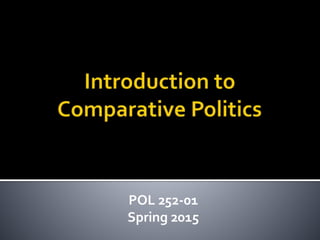Pol 252_SP15_ authoritarian_regimes_democratic_breakdown
•
0 j'aime•333 vues
Pol 252_SP15_ authoritarian_regimes_democratic_breakdown
Signaler
Partager
Signaler
Partager

Recommandé
Contenu connexe
Tendances
Tendances (20)
Political Science 1 - Introduction To Political Science - Power Point #5

Political Science 1 - Introduction To Political Science - Power Point #5
Slide 1 WestCal Political Science 1 - US Government 2015-2016

Slide 1 WestCal Political Science 1 - US Government 2015-2016
Political Science 1 - Introduction To Political Science - Power Point #3

Political Science 1 - Introduction To Political Science - Power Point #3
Slide 1 WestCal Political Science 5 Western Political Thought 2016

Slide 1 WestCal Political Science 5 Western Political Thought 2016
Political Science 7 – International Relations - Power Point #4

Political Science 7 – International Relations - Power Point #4
En vedette
En vedette (6)
Child Protection Experiences and Challenges- AMISOM Somalia Perspective

Child Protection Experiences and Challenges- AMISOM Somalia Perspective
Similaire à Pol 252_SP15_ authoritarian_regimes_democratic_breakdown
Similaire à Pol 252_SP15_ authoritarian_regimes_democratic_breakdown (20)
Authoritarian Oligarchies: Modern Day Feudal Rule by an Elite Few

Authoritarian Oligarchies: Modern Day Feudal Rule by an Elite Few
Plus de atrantham
Plus de atrantham (20)
Dernier
Mehran University Newsletter is a Quarterly Publication from Public Relations OfficeMehran University Newsletter Vol-X, Issue-I, 2024

Mehran University Newsletter Vol-X, Issue-I, 2024Mehran University of Engineering & Technology, Jamshoro
Dernier (20)
UGC NET Paper 1 Mathematical Reasoning & Aptitude.pdf

UGC NET Paper 1 Mathematical Reasoning & Aptitude.pdf
Jual Obat Aborsi Hongkong ( Asli No.1 ) 085657271886 Obat Penggugur Kandungan...

Jual Obat Aborsi Hongkong ( Asli No.1 ) 085657271886 Obat Penggugur Kandungan...
ICT Role in 21st Century Education & its Challenges.pptx

ICT Role in 21st Century Education & its Challenges.pptx
Food safety_Challenges food safety laboratories_.pdf

Food safety_Challenges food safety laboratories_.pdf
Micro-Scholarship, What it is, How can it help me.pdf

Micro-Scholarship, What it is, How can it help me.pdf
Unit-V; Pricing (Pharma Marketing Management).pptx

Unit-V; Pricing (Pharma Marketing Management).pptx
Russian Escort Service in Delhi 11k Hotel Foreigner Russian Call Girls in Delhi

Russian Escort Service in Delhi 11k Hotel Foreigner Russian Call Girls in Delhi
Pol 252_SP15_ authoritarian_regimes_democratic_breakdown
- 3. “What I continue to believe is that an authoritarian model, in this day and age, is going to be less and less sustainable… Part of it is just the flow of information. Authoritarianism to some degree depends on the ignorance of people, and the Internet and social media means people have access to information.” Who might have said this?
- 5. Who Rules? Answer: Single Individual or Small Elite Political Participation: Players and Rules No Democratic Accountability Court System Constitutional Guarantees
- 6. Connection to “waves” of democratization Declined significantly in 1970s Number have still taken and maintained power Robert Mugabe Fidel Castro
- 9. Socialist economy + Authoritarian Politics Common Features: Encompassing Ideology Single Political Party led by Dominant Leader Mobilization of Support for Party and Leader State Ownership of Media Use ofTerror andViolence
- 10. Historical and Current Examples ofTotalitarian States Joseph Stalin (Soviet Union) Adolf Hitler (Germany) Mao Zedong (China) Kim Jong-un (North Korea)
- 12. Monarchies Military Dictatorships Civilian Dictatorships
- 18. Who Rules? Emphasis on Royal Descent Political power and authority is variable Ceremonial duties to major policy decisions Challenge is asserting political legitimacy Without election, how do you make citizens happy?
- 20. Common rule from World War II to 1980s Africa Asia Latin America Middle East Who Rules? Group of military officers Power by coup d'état
- 22. #1: Breakthrough Coup -Traditional elite overthrown by military #2:Veto Coup - High-ranking officers order repression of mass movement #3: Guardian Coup (“Musical Chairs” Coup) - Power seized for efficiency, national security, or corruption - Leadership shifts between military and citizens #4: Bloodless Coup - Threat of violence enough to defer coup from happening #5: Self Coup - Assumption of power through co-opting institutions - Declaration of “emergency” powers
- 23. How does military consolidate power? Cannot use violence Convince citizens of legitimacy / right to rule Three Responses: Return to Democratic Rule…eventually… Hold Elections…but military party has advantages Defend Nation Against Internal/ExternalThreats
- 24. 1) Martial Law Curfews, Banning Protests/Demonstrations 2) Use of Spies/Informants Mission: Find and Kill Dissidents 3) Ban Opposition Media Outlets
- 26. Dominant Party Personalistic
- 28. COMMUNIST REGIMES Organization Hierarchy Rise to Power and Legitimacy Revolution Nationalism FASCIST REGIMES Organization Dominant Political Figure Rise to Power and Legitimacy Ideology Promotion of “Democracy” Charismatic Leadership
- 30. Person supported by party or military Retention of political control and authority Characteristics: Weak or nonexistent press Strong secret police Arbitrary use of state violence
- 33. Contests are not “free” and fair,” heavily favoring the ruling party
- 35. Historical Institutionalism Poverty and Inequality State Weakness and Failure Political Culture Barriers to Collective Action